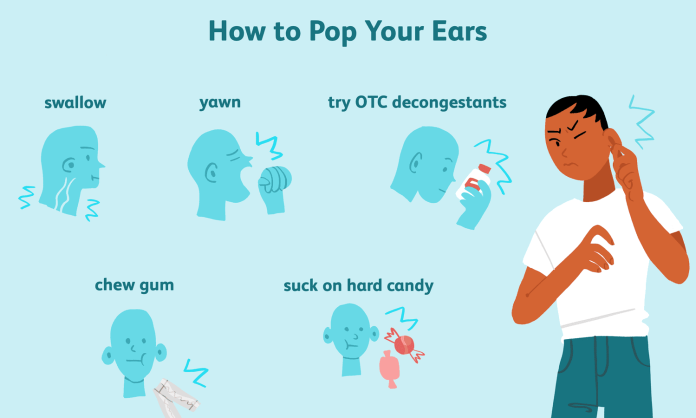How to Unclog Ears After a Flight: Easy Remedies for Clogged Ear – Traveling can be pretty exhausting sometimes. With jet lag and dry air problems, there is one more issue that annoys several people and is called “airplane ears”.
What Are Airplane Ears?
It is a feeling that your ears are blocked due to the changes in the pressure, and it is a cherry on top if you have a cold.
What Is Ear Barotrauma?
Ear barotrauma is the word that doctors use to describe it. A person might feel discomfort and pain while going through this. If you have a cold, you might even feel your ears are blocked even after you land. Pinching your nose or blowing to feel better is definitely not advisable by doctors but there are a few mouth exercises that might help you get some relief from the pain.
What Causes Airplane Ears?
When the pressure changes during the flight, it causes the ears to get blocked. Your Eustachian tube links your middle ear, which houses the eardrum, to the back of your nose and upper neck. This tube opens and closes throughout the day to keep the air pressure between your nose and your ears equal. These changes in air pressure affect you more if you get on a plane with a cold or another head problem that causes congestion in your nose. Active infections in your sinuses or ears might hurt or injure you because it’s hard to balance the pressure in your ears.
Also read: 10 Mistakes To Avoid When Booking Your Next Flight
How to Unclog Ears After a Flight?
Patients have been using the Frenzel maneuver to equalize their eardrum pressure since the late 1930s. You attempt to say the letter “K” using a pinched nose and a closed mouth. Jaw muscles move when you chew, yawn, or swallow water or another liquid, which can reopen the Eustachian tubes. If you’re traveling with a toddler or infant and suspect that their ears are blocked up, have them drink water or juice or use a pacifier to get the muscles of their mouth moving. One popular remedy for ear pops is chewing gum, which would also look cool while traveling. Taking steam can also help you feel better since it clears your nose and the body feels warm.
After a person land back, they usually start feeling better in a few hours, or some people start feeling better in a few minutes but if it stays longer than a day, you should definitely get it checked by a professional.
Risk Factors for Airplane Ears
Vulnerable Groups (Toddlers, Newborns, etc.)
Certain types of people also experience clogged ears more often people as newborns and toddlers, whose Eustachian tubes are smaller and more horizontal than those of adults.
Conditions That Increase Risk (Colds, Sinusitis, etc.)
A cold, sinusitis, allergic rhinitis, and sleeping as pressure fluctuates on an airplane are other risk factors.
Potential Complications
There can also be several complications such as Acute ear infections, Chronic tinnitus or even hearing loss so it is better to take precautions and understand your body.
How to Prevent Airplane Ears
Using Earplugs
You can Use earplugs during takeoff or landing to help pressure slowly equalize will be helpful for you.
Avoiding Travel When Sick
If you have a sinus or ear infection, cancel any plans to travel by air because it might become worse and you can get more sick.
Staying Awake During Takeoff and Landing
Stay up when the plane is taking off and landing, sleeping in the air is much safer.
Using Decongestants Properly
If you are severely sick and the doctor prescribes you to take a decongestant, take it 30 to 60 minutes before travel.
When to See a Doctor?
If you face any challenges like ear bleeding, have even a slight fever, suffer from hearing problems, or have ear pain, then you should consult the doctor immediately as these things grow very quickly and cause your body damage in an unwanted way.
Conclusion
You may get clogged ears after a flight, but there are remedies for airplane ears. Among these techniques are the Frenzel maneuver and oral muscle movements. You can also prevent airplane ears by using earplugs before your plane departs or when it lands, allowing yourself to fall asleep only when the plane is airborne, and taking a decongestant pill 30 to 60 minutes prior to your flight. Airplane ears usually go away on their own. But if they don’t resolve or there are other symptoms like fever, earache, or discharge, you should definitely consult a doctor because you cannot take risks with your health!
Also read: United Adds New Flights as Part of Domestic Push
FAQ About Airplane Ears
What causes clogged ears after a flight?
Clogged ears, or “airplane ears,” occur due to changes in air pressure during a flight. These changes affect the Eustachian tube, which connects the middle ear to the back of the nose and upper neck, leading to discomfort and a feeling of blockage.
How can I relieve clogged ears after a flight?
Some remedies to relieve clogged ears include The Frenzel Maneuver, Yawning or swallowing, chewing gum or drinking fluids, and taking steam.
Is it safe to blow my nose to clear clogged ears?
Blowing your nose forcefully is not recommended, as it can damage your ears. Instead, try swallowing, yawning, or using the Frenzel maneuver.








